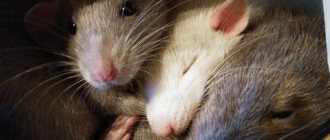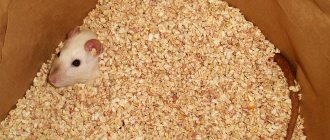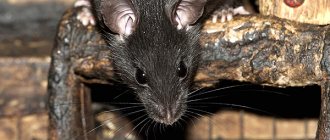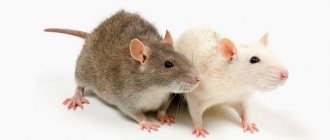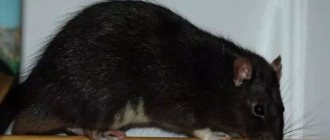Rats often choose country houses, food warehouses and other premises with food sources and unfavorable sanitary conditions as their habitat. The appearance of rodents near a person threatens not only spoiled things and food. If at least one individual is found in the house, the control process should immediately begin. Animals are distinguished by good survival and adaptability, high productivity, which allows them to quickly increase their population size.
Rats are carriers of pathogens of many dangerous diseases and infections. The fight against rodents begins with studying information about the characteristics of their life, reproduction, and physiology. The result of extermination measures will largely depend on knowledge of what rats are afraid of. In the fight against rodents, it is important to deprive animals of comfortable living conditions, cut off the path to a food source, and use preventive measures to prevent the reappearance of unwanted individuals. To do this, you should keep the room clean, avoid the accumulation of garbage and unwashed dishes, and do not leave food in the public domain.
The arsenal of modern means aimed at getting rid of rats is presented in a wide variety - these are folk remedies, repellent smells and sounds, various traps with glue and poisonous baits, chemicals, ultrasonic equipment. They differ in their effectiveness. The choice of a specific method should include an analysis of the situation and a preliminary assessment of the population size. The process of fighting rats is complicated by the rapid adaptation of rodents to new conditions and unfavorable factors.
What smell are rats afraid of?
In attempts to get rid of unwanted rodents on their own, country house owners often use repellent odors. It is based on the use of herbs and solutions that have a strong aroma that is not pleasant to animals. Let's look at what smell rats are afraid of:
- Peppermint.
Fresh or dried herb, essential oil, extract or concentrated solution will do. Plant twigs or fabric soaked in the substance should be left near rat holes. - Ledum.
This is an intoxicating grass for rodents, which they bypass several meters away. The plant is suitable for scaring rats away from the house. It will enhance the effectiveness of preventive measures and can perform a barrier function, reducing the likelihood of unwanted animals reappearing in the house. Ledum should be placed in the corners of the room. Remember that this is a poisonous herb. - Elder.
The plant contains hydrocyanic acid, which has a toxic effect on rats. This substance is lethal to rodents. Planting elderberries around the perimeter of a summer cottage and garden plot is a common method of protecting against the appearance of rats. - Chamomile.
To repel rats, you can use fresh plants from a flower bed or a pharmacy herbal mixture. - Tansy. A few inflorescences near rodent burrows will help get rid of unwanted guests in the house. The pungent smell of grass forces rats to leave their habitual place and migrate to the next room.
- Wormwood .
The plant has a bitter and astringent aroma that can help protect the area from rats.
To fight rodents with the help of odors, it is worth remembering the main rule - the sharper and stronger the aroma, the greater the likelihood of obtaining the expected effect. For this reason, it is better to use essential oils instead of fresh plants and herbal infusions. They are characterized by a high concentration of odor, which lasts quite a long time on the treated surface. Cotton swabs or rags coated with essential oil should be placed near habitats or directly into rat holes.
Rodent control using aromatic herbs and essential oils can only be effective in the presence of single individuals. If the rats have managed to reproduce and their population is large, more serious and effective methods of treating the premises will be required. Fragrant plants and essential oils can also be used as a preventative measure and a barrier method of protection against the appearance of rodents on the site.
We expel pests from non-residential properties
For a long time, people have noticed what rats are very afraid of - the smell of burning wool. To drive them out of their home, people burned the caught rodent and stuffed it into a hole or simply left it lying in the barn. This helped scare off relatives. Today, this method is still relevant, but instead of an animal corpse, you can limit yourself to scraps of natural fur or shreds of wool. They are burned on the street and brought into the house already scorched.
Another similar method is suitable for a barn or garage. Only instead of wool it uses rubber. Neither mice nor rats like this smell, and it is also unpleasant for humans. Therefore, such an extreme method is used only in non-residential premises.
Such strong-smelling substances as:
- Naphthalene
- Kerosene
- Colognes produced in Soviet times and not only.
By spraying them in your shed or garage, you can get rid of rodents very quickly. But all these methods have one drawback. They do not lead to the death of pests, but only temporarily scare them away. Once they disappear, the gray brethren will return to you again.
What sounds are rats afraid of?
Ultrasonic, magnetic resonance and electromagnetic rodent repellent devices are based on what sounds rats are afraid of. The equipment is designed to generate waves that rodents pick up. The resulting sound causes irritation and repels parasites.
Experts note the low efficiency of such devices. Only some ultrasonic repellers, which produce waves with a frequency above 20 thousand Hertz, demonstrate good results. But most of the devices on the market do not have the advertised effect.
Rats can be repelled by sounds if you know their natural enemies. Rodents react much faster to the imitation of the rustling of a creeping cat or the flapping of a bird's wings than to loud screams, whistles, or human voices. This is due to the fact that in natural conditions, most rats end their lives due to attacks by birds and other animals. Experiments have found that rodents are also afraid of any unknown sounds. They try to avoid uncertainty and any potential source of danger.
The most important category of sounds that demonstrates high effectiveness is imitation of a rat's danger signal. Rats transmit messages and signs to each other during severe fright, near death, and at moments of aggression. These sounds instinctively cause fear in rats and a desire to escape. Rodents communicate with their relatives through ultrasound, which formed the basis for the creation of electronic repellers. The device will be effective only if it generates waves in a certain frequency range.
How to ventilate the room after treatment
The exterminator must have access to all corners and crevices in the room.
If you had to call exterminators to eliminate pests, it is worth checking with them in advance about the necessary information about subsequent cleaning. Before starting etching, it is necessary to comply with some conditions: remove all food and personal belongings, cover the furniture with durable film and move it to the center so that you can go to the corners and along the walls.
After finishing the treatment, it is necessary to ventilate the room for at least an hour and prepare rubber gloves so that the skin does not become irritated. Cleaning should include the following:
- Cleaning walls, floors and window sills with disinfectants;
- Treating furniture that is regularly touched (door handles, switches, armrests) with a soda solution;
- Washing textiles (bedspreads, curtains) at temperatures above +80 degrees, if possible it is better to treat with steam or boil.
What grass are rats afraid of?
Opponents of chemicals and poisonous drugs prefer to use aromatic plants and herbs in the fight against rats. Their action is based on the fact that the leaves, stems or inflorescences contain a substance with a pungent aroma that is toxic or fatal to rodents.
If you know what grass rats are afraid of, you can create an effective protective barrier against rodents in your garden. It should be remembered that it will not be possible to get rid of a large number of pests in this way. The grass can scare away only a few individuals. Most often the following plants are used for these purposes:
- Cilantro or coriander.
The aromatic essential oil contained in the plant effectively repels rodents. Grass can be planted around the perimeter of the site, seeds and stems can be placed in different corners of the room. - Flowers - daffodils, calendula.
Decoctions from fresh parts of the plant or pharmaceutical herbal mixture should be applied to cotton swabs and left near rat holes. - Peppermint.
The pungent odor has a repellent effect against rats and mice. - Elder.
The plant has long been used to get rid of pests. - Tomato stems and leaves.
They contain a toxic substance with a specific aroma. To repel rodents, the green parts of the plant can be dried and spread indoors and around the house. - Blackroot.
The second name of the herb is rat racer. To get rid of rodents, you need to prepare a decoction or powder from the rhizome. - Autumn colchicum.
The most poisonous part of the grass is the seeds. But other parts of the plant also have a toxic effect on rats and mice.
Another effective way to repel rodents using herbs is poisonous bait made from rhizomes. Four-leaf raven's eye, aconite, castor bean seeds, and hellebore are suitable for these purposes.
Carefully!
Some plants are poisonous and require special care when working. It is important to prevent contact of such herbs with pets and keep them out of the reach of children. Gloves should be used when treating a room with poisonous plants.
General issues
Why do mice appear in houses?
In addition to the already mentioned reason for living warm and closer to food, the reason for the appearance of rodents may be the presence of a cluttered space where it will be more convenient for them to hide.
How to understand that there are rodents in the house?
If you haven't caught your neighbors by surprise running under the kitchen table in the open, then you can understand that small uninvited mammals can be found using special clues:
- small holes - holes - in the area of the baseboards; - musty smell; - rustling in silence, especially at night. - mouse droppings in the corners of the room, crevices and other hard-to-reach places.
Of course, if you have a cat, then she will be the first to sense the presence of prey in the house and, perhaps, will rid the house of it without any action on your part.
Why get rid of rodents?
Guests such as mice or rats, despite their size, cause considerable damage to property, destroying food, spreading dangerous diseases, damaging wallpaper and furniture. In addition, they multiply quickly and in a year, one undetected mouse can lead to a dozen.
Are rats afraid of cats?
It is known that cats are good hunters and fighters against rodents. But are rats afraid of cats? Is it possible to scare away unwanted animals from your home in this way? Cats are excellent at protecting the house from mice, but not all of them are capable of fighting rats. Cats that live in an apartment do not see the need to hunt and gradually lose this skill. Domestic tailed animals are frightened by the large size of rodents. In this case, it would be more effective to get a large dog that can easily cope with a gray rat.
Classification of “fears”
Over the thousand-year history of forced proximity to pests, man has come up with a hundred methods that can not only repel mice, but also drive them out of the house. If we classify these methods by type, we can distinguish three areas:
- natural enemies, that is, cats and natural predators;
- repellents, or, in simple terms, repellent odors, they can be of both natural and synthetic origin;
- physical methods of influence, in particular sound vibrations in the air, caused, for example, by hitting a sneaker on the floor. Although, as a stunning element, it is easier to use special devices based on ultrasound, which is elusive to the human ear.
What are rats afraid of - folk remedies
Opponents of pesticides use traditional methods of control in attempts to rid the house of rats. They can bring results if single individuals are found in the room that have not yet had time to reproduce.
Let's look at what rats are afraid of, and folk remedies that are most effective:
- Mechanical traps.
Bait is placed in the device, and when the rat is inside, the trap closes. It will not be possible to destroy a large number of rodents in this way, since before death the individual makes warning sounds of danger. Other rats will no longer approach the trap. - Use of improvised means.
The most popular mixtures are flour, gypsum and sugar; rosin, borax and powdered sugar. Alcohol, quicklime, and a solution of milk and beer are also used.
Folk methods of struggle also include herbs and aromatic plants, which were discussed above. All of them are characterized by low efficiency and are not able to rid the house of a large concentration of rodents.
Rat briquette
It is also characterized by high efficiency. When exposed, rodents begin to die within a couple of days. A similar substance is used as bait.
The advantages include the following points:
- Has a suffocating effect. In this case, the rats escape into the open air and do not die indoors. A relatively small number of drugs have this property.
- The possibility of a cadaveric odor is eliminated, since the rats leave it before the moment of death.
- Long lasting use. The drug is effective for several months.
- The price of the drug is slightly higher than others, but this is due to its effectiveness.
What are rats afraid of and how to get rid of them
The optimal and effective solution in the fight against rodents is the help of a professional team of exterminators. They can rid your home of even a large population of unwanted animals. The effectiveness of the event is the result of experience, knowledge about the characteristics of the lifestyle and reproduction of rodents.
Recommended Links
Means and methods of exterminating rats can be found here.
If you don’t know what rats are afraid of and how to get rid of them, it’s better to contact. Specialists will select an effective and quick way to exterminate pests and treat the premises using professional tools and equipment. To call a team, contact a company representative by phone.
Does water harm mice?
Almost all types of rodents swim quite well, so they are not at all afraid of water. If you want to get rid of them using just such a product, you will have to build special traps for rodents. They need to be made from deep, smooth, slippery containers half filled with water. The pest will fall into such containers and will not be able to get out of them on its own.
Important: if you have one or two mice in your house, this method can be quite effective. But he cannot cope with a large population of these mammals. That is why, in the event of a parasite invasion, it is recommended to use other methods that have a more widespread impact. To do this, you just need to know what plants and chemicals mice cannot tolerate.
Homemade trap
There are two best mouse traps in this category. They help well in different situations. Each of them can be built from available materials, without running to the store for mousetraps.
Plastic bottles
Making mousetraps with your own hands is extremely easy. You can place it in any convenient place. To catch a mouse, seeds, grain, fresh bread, buns, meat, lard, smoked meats are used as bait:
- Cut off the neck.
- Lubricate the walls of the bottle with vegetable oil.
- They lay down bait.
- Lower the cut part neck down back into the bottle and secure with tape.
- They begin the fight by leaving the trap in the room overnight.
The mouse crawls into the bottle for food, but the slippery walls prevent it from getting out of the trap. Several more relatives may join her.
Bottle and bucket traps
Bucket
An ordinary bucket with a capacity of 10 liters will help to get rid of mice in a private house. It is filled 1/3 with water. Straw, seed husks, and leaves are laid out on top. Pour 1 tbsp. a spoonful of vegetable oil for flavor, pour in the grain. A bridge is attached to the bucket.
The mouse climbs along the stick to the bucket following the smell of the bait, a layer of husk hides the water. The rodent falls down, drowns, the upper layer is restored, and waits for the next victim.
On a note!
Using a bucket you can catch several rodents in one night. You can place the device in any convenient place.
Spices against rodents
Bay leaves should be placed in drawers, corners and mouse habitats.
In addition to plants and flowers, mice cannot tolerate the smell of spices. What smell repels mice?
- Bay leaves, coriander, cardamom, cilantro and cloves should be scattered in food boxes or brewed a strong decoction and thoroughly wiped down the furniture in the kitchen. You can also use the essential oils of these plants - mix them with water and alcohol or with vegetable oil and wipe the floor and furniture;
- Hot red pepper or chili pepper quickly dissipates, and therefore it is better to scatter it near holes and crevices. This will allow the aroma to immediately penetrate into the mouse passages, while the pests themselves will step into the seasoning, lick it off and get an upset stomach;
- Sage leaves can be finely crushed or set on fire and used to fumigate burrows and passages;
- The smell of freshly ground coffee, horseradish and garlic also irritates mice.
Important! Seasonings can be placed on the table and in drawers where food is stored, placed in corners and near likely passages.


